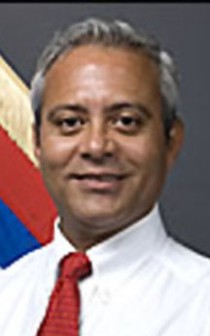Belize Minister of Public Security and Policing, Douglas Singh has indicated that his country is fully behind the CARICOM pilot project “Youth Gangs and Violence: partnering for prevention and social development”, but he warned that interventions should be country specific.
Belize is one of four countries selected to pilot the project while the others are Guyana, St Kitts and Nevis and Trinidad and Tobago, said a press release from the CARICOM Secretariat at Turkeyen.

The project was presented to the Belize Minister of Public Security and Policing during a series of stakeholder consultations which started in that country last week Tuesday.
The release noted that the project is an offshoot of the CARICOM Social Development and Crime Prevention Action Plan which was developed by the CARICOM Secretariat in tandem with the United Nations Office of Drugs and Crime (UNODC) to “prevent and reduce levels of violence and crime in member states, through a cross-sectoral and multi-disciplinary approach…”
The plan is grounded on five pillars – reduce violence; foster social inclusion; promote integration; empower victims; and protect the environment and economic resources – which are linked to the regional development agenda.
Last Tuesday, Minister Singh told a CARICOM Secretariat delegation, headed by Beverly Reynolds, Programme Manager, Sustainable Development that Belize had in train social initiatives that could interface with priority actions in the pilot project.
His views were echoed by the Directors of the Restore Belize Project and the Conscious Youth Development Programme, Mary Vasquez and Edward Broaster who articulated their willingness to work with the CARICOM Secretariat in implementing a specific pilot gang prevention and youth and community development project in Belize.
They called for a comprehensive exit strategy for gang-leavers and a review of policing techniques to include community policing.
Chairman of the Belize Truce Committee Paul Cassanova and other key stakeholders have also thrown their full weight of support behind the pilot, but they were in agreement that efforts must be concerted and sustained in order to have an impact.
At the broader consultation last week, Belize Commissioner of Police, Crispin Jefferies who gave the opening address, spoke to the positive impact of social interventions on crime and violence in Belize. He underlined the importance of providing social programmes for young people to keep them away from gangs and welcomed the CARICOM initiative, noting that “the government of Belize is fully behind the process.”
Reynolds, who facilitated the consultations, noted the importance of each category of stakeholders in mitigating crime and violence and in effecting change. She underscored the debilitating effects of violence on the social and economic development of the region and emphasized the adoption of a multi-sectoral approach to reducing crime and violence.
Meanwhile, presenter Loris Heywood stressed that the breakdown of family and family values in the region had left both a psychological and physiological void in young people who gravitate towards gangs as an alternative family.
Another presenter, Dr Izben Williams gave a comprehensive presentation on the nature and causes of violence in the Caribbean, pointing to the homicide trends in several CARICOM member states and stressing that violence was preventable through a multi-sectoral integrated approach.
Piecemeal approaches, he argued, were counter-productive. What was needed, he stated, was a process in which the problem was defined and monitored, the causes established, interventions tested and the most effective ones applied and evaluated.
Broaster, who is also a superintendent of police in Belize, shared his varied experiences in policing and working with gangs, underscoring the importance of unity in effecting social change. He also pointed out that the Belize media was serving up what he described as a steady diet of negative publicity, and urged them to endeavour to report the positives as well.
The series of consultations was organized with the support of the United Nations Development Programme (UNDP) to present and discuss roll out of the project, identify pilot communities and a mechanism for the implementation of the project in the communities, identify a team to undertake a mapping of the selected communities and identify immediate training needs in the areas of gang formation and violence prevention. The next stop will be St Kitts and Nevis, the release added.









